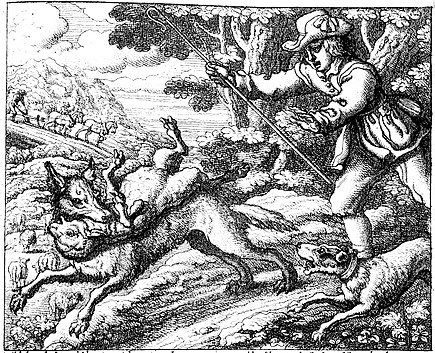Well… Let’s see how well we can unpack that for the benefit of the entire class! First I’d like to start out with a very well know Fable attributed to Aesop: The Boy Who Cried Wolf.
There was a village on the outskirts of a forest. A shepherd boy used to take his herd of sheep across the fields to the lawns near the forest.
One day he felt very bored. He wanted to have fun. So he cried aloud “Wolf, Wolf. The wolf is carrying away a lamb”. Farmers working in the fields came running and asked, “Where is the wolf?”. The boy laughed and replied “It was just fun. Now get going all of you”.
The boy played the trick quite a number of times in the next few days, and always the farmers would come and face the hysterical laughter of the little shepherd.
A few days passed and the boy, perched upon a tree, as singing a song, there came a wolf. The boy cried loudly “Wolf, Wolf, The wolf is carrying a lamb away.” There was no one to come. The boy shouted “Help! Wolf! Help!” Still, no one came to his help. The villagers thought that the boy was playing mischief again.
The wolf carried a lamb away.
Aesop
So this a fable that most of us heard as children, and usually we would be asked what lesson we learned. The lesson here is “don’t lie or others won’t believe you when you are telling the truth.”
But what if I was to tell you that that was also a part of the theme of the story?
We have a little boy who is starved for attention and bored, and in order to alleviate this low level of discomfort he shouts, “Wolf! Wolf! Help!”just to be surrounded by the rest of the village, all worried that there is a wolf eating the livestock.
The boy laughs at the villagers, surprised they came to his aid, and tells them to go back. But this doesn’t happen once. It happens multiple times in the story. Though we do not read every instance, we are told the boy did this, “a number of times.”
It is a constant in the story. Every time the boy cries wolf, the villagers come to help only to be laughed at, until the day comes when the boy sees a real wolf and it takes a lamb away. No matter how much he cried, no one came to help.
This story is rather simple, but there are other more complex themes one can glean from books and movies. Recently I watched Finding Nemo, a brilliant movie about a father’s search for his lost son.

For those that haven’t seen the movie, the father is a clown fish who is terrified of the world around him. Throughout the movie he is tested on how badly he wants to find his son, Nemo, who has been captured by a diver. The whole movie is centered around the father’s relentless search for his son.
That is not the theme. The theme is that though the world is a terrifying place, it is also a place of wonder and amazement, but you won’t see that if you are constantly focusing on the scary stuff that could happen.
The father faces his fears every step of the way: facing sharks; jellyfish; the deep, dark ocean; seagulls… He swam a guantlet or terror all the way to Sydney, Austrailia to find his son and in so doing experienced a beautiful world full of different fish and he made some new friends along the way.
Now, what I would like to mention next is theme is often something that you don’t really plan. It is something that bubbles up as the story goes on. The writer doesn’t always have a clear theme in mind, but as the story unfolds, they should notice patterns in the way their characters act and react to the situation they are in.
For instance, in the book that I am currently writing, The BMCR: Boot Camp, the characters face discrimination, loneliness and fear… Now these themselves are not themes, but they are tools to help find the theme. My main characters each deal with different levels of loneliness and isolation, but they eventually learn how to lean on each other as a family.
Daryl, my main character, has a deep fear of leaving his hometown. He rationalizes that he is needed there, even if it would mean not realizing his full potential. He is forced into the armed services and discovers a new world of wonder and ultimately what he was looking for the entire time: adventure, heroism, and unbreakable bonds.
So one could argue a theme for that is dive head first into new experiences, no matter how scary, you may find what you’re looking for or something better.
But that leads to another characteristic about theme. It really is what the reader gets out of your story. Someone else could watch Finding Nemo and get a different theme than what I did. Someone could read my book and determine the theme is something else than what I determined. It is important to understand that the theme needs to be allowed to form on its own.
You can have a theme in mind when you sit down to write, but I would suggest that you let the story flow onto the word file before you enlighten anyone with your crafted ideal.
In short, a theme is simply a lesson that the reader leaves with after consuming your story, and honestly I wouldn’t fret about it too much in your own work, because it will sort itself out. Just keep writing and you’ll find it. From my own experiences, knowing what the theme is before you write can really hinder the creative process, but this is only my opinion. As a writer, you are an artist and there is no wrong way of writing.

Leave a Reply